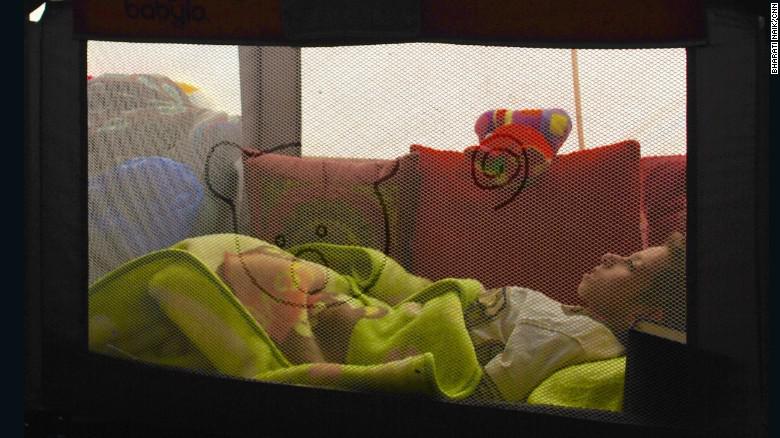
Sunbeams stream through the white canvas wall of the tent, bouncing off the crib and bedding and making it glow in bright colors: red, green, yellow.
Inside its mesh walls, barely breathing, 6-year-old Alyaman Daar lies dying.
Alyaman and his family fled Syria when the country's bloody civil war meant they could no longer access healthcare and medication to battle his muscular dystrophy.
His parents, Wasel and Johaina, from Deir Ezzor, were sure that if they could just make it to Europe, they could give their son the medical help he so desperately needs.
But having finally reached what they once saw as the "promised land" -- via Turkey and a perilous and costly voyage across the Mediterranean -- they have found no hope, only heartbreak.
Marooned in a camp at a gas station close to the Greece-Macedonia border, unable even to register as refugees, they can do little more than watch as Alyaman fades away before their eyes.
And to make matters worse, their youngest daughter, 1-year-old Bisan, is now showing signs of the same condition which looks likely to take the life of their son within days.
"I wish we had access to proper medical care, but in this tent it's very difficult," says Johaina. "The only reason we left our home was to seek treatment for our son. And now my daughter also has similar symptoms."
Johaina appears sadly resigned to the loss of Alyaman, but she becomes distressed at the thought of her daughter going through the same torment.
"It's from God, so we must accept his fate; but now I am worried about my daughter," she says, wiping away tears. "It is very difficult to get the kind of medical care we need."
Wearing a purple dress and gold earrings and fussing in her father's arms, Bisan seems like any other toddler. But the family says she can no longer crawl or grip their fingers. These were the same clues that pointed them to a diagnosis for Alyaman back in Syria five years ago.
There is no cure for muscular dystrophy -- a genetic disorder that causes muscle weakness and eventually the loss of muscle mass -- but medication and therapy can ease a patient's symptoms and prolong their life.
The crib, set up within a tent filled with the clutter of four families' upended lives, is intended for a much younger child, but Alyaman is tiny and frail, and fits easily among the blankets, a Quran tucked at his side.
Dr. Zaher Sahloul leans in and tries to wake him, calling his name and stroking his pale cheek, but there is no response. His long eyelashes do not flutter, his eyes remain closed.
"Alyaman's prognosis is very bad," Sahloul says. "He's barely able to eat or swallow; he's dehydrated; he has malnutrition; his oxygen level is very low; he's not reacting to stimulation.
"In a condition like this, in the U.S. we would usually treat the patients with a nasogastric tube for feeding ... oxygen, IV hydration ... [maybe] a respirator," he says.
"But in a tent like this, where they don't have access to any advanced medical care, he's probably going to die within a few hours."
The one relief for Wasel and Johaina, amid all of their pain, is that their middle child, 3 1/2-year-old daughter Lyan, shows no symptoms of muscular dystrophy.
When Alyaman was healthier, he and Lyan were very close. Until very recently he would respond to her laugh, or if she called his name. But even that has stopped now.
Now Lyan sits alongside her mother, her big, dark eyes watching intensely as Johaina tries to make her son eat, feeding him tiny amounts of milk formula through a syringe.
The only sign he is conscious are his half-open eyelids, but there is no recognition, no light in his eyes, even when his mother coos lovingly at him and tenderly touches his face.
His arms are contorted, his body stiff, his face expressionless. Only his mousy brown hair, topped with a Tintin-like cowlick, is recognizable from the screensaver photo on his father's phone -- a picture taken 10 months ago, before they came to Greece.
Doctors say the family knows Alyaman has a very short time left.
For Sahloul and his colleague Dr. Hanne Lossius, from the Syrian American Medical Society (SAMS), there is sadness that they cannot do more for Alyaman, and anger that Europe is not doing more to help all those like him, trapped in camps and in need of better medical care.
"It is very painful that we have, in the 21st century, families like this in Europe [who] don't have access to the minimum that they could have even in developing countries," says Sahloul.
"It is unacceptable for any human being that a family like this, who have children who are suffering for nothing -- for no reason except that there's a war in their homeland -- who expected to be treated with dignity in Europe, that they are not getting any of that."
"It's inhuman," adds Lossius. "It really comes down to common decency. A child should not spend his or her last hours of life in a tent like this."
"We've met people here saying that they want to go back to Syria -- to die with honor, fast -- instead of dying slowly here. That's what Europe is doing right now. This is killing them, and we need to do something."
For Wasel and Johaina, there is one last shred of hope: That people will hear their story and be inspired to act, and that they and their daughters will find a home in Europe.
"It is too late for my son," says Johaina, dabbing at her eyes with a tissue. "But I need your help to save my daughter. I don't want her to suffer like her brother."
Source: CNN
 FR
FR EN
EN AR
AR








